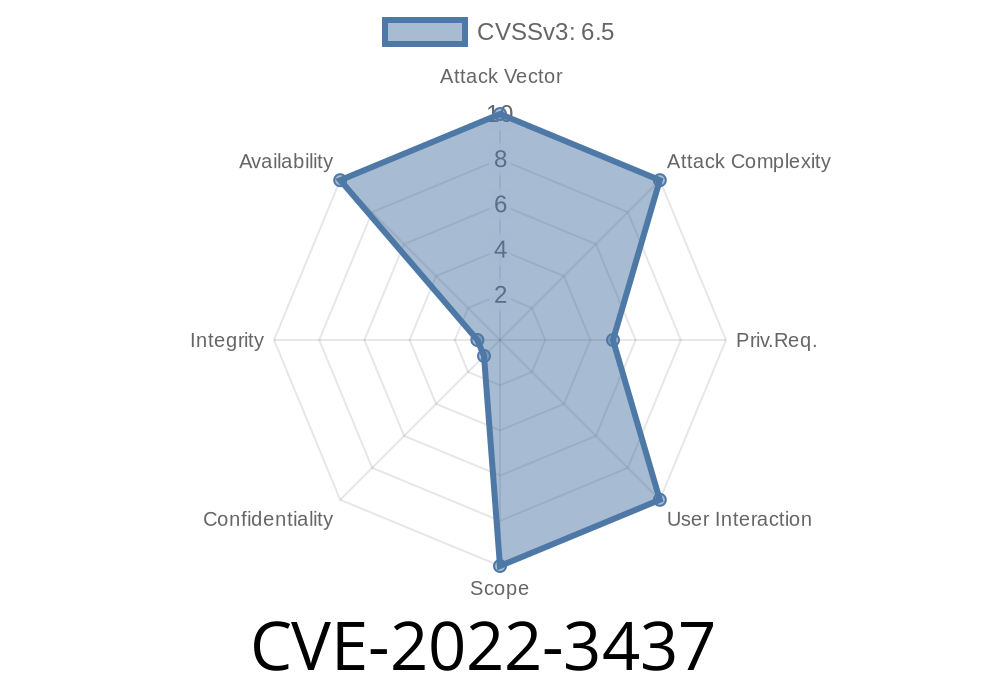In August 2022, researchers uncovered a serious vulnerability in Samba, a widely used open-source implementation of SMB/CIFS networking protocols. This flaw, now known as CVE-2022-3437, affects the Heimdal GSSAPI library utilized by Samba for authentication. It involves a heap-based buffer overflow within the cryptographic routines that process DES and Triple-DES wrapped tokens, specifically in the unwrap_des() and unwrap_des3() functions.
This post breaks down how the vulnerability works, its security impact, code-level details, and what you can do to keep your systems safe.
What is CVE-2022-3437?
CVE-2022-3437 is a heap-based buffer overflow that can be exploited when Samba's Heimdal GSSAPI library processes maliciously crafted authentication packets. The bug is triggered when decoding tokens encrypted using DES or Triple-DES. Because of how the decryption buffer is allocated, a specially crafted small token can cause the library to write past the end of an allocated memory buffer.
Crash the Samba service (Denial of Service)
- (Potentially) Run malicious code with the privileges of the Samba server process (not proven as of now, but theoretically possible)
The vulnerability is remotely triggerable — so any accessible Samba service using vulnerable Heimdal GSSAPI code is at risk.
Where is the Bug?
The bug hides in authentication code — the unwrap_des() and unwrap_des3() routines in Heimdal’s GSSAPI. Here’s the bad logic:
1. Token Decryption: When a packet comes in, these functions allocate a memory buffer for the decrypted output.
2. Length-Ignored Allocation: The buffer size is set based on a value supplied in the token header—if the token lies about its size, a tiny buffer is created.
3. Data Overwrite: The function then writes the decrypted data, which is larger than the buffer, overflowing heap memory.
Let’s look at a simplified example (in C-like pseudocode) illustrating the mistake
unsigned char *buf;
size_t len = get_packet_length_from_token(token);
// Malicious attacker makes 'len' very small, e.g., 2 bytes
buf = (unsigned char*) malloc(len);
// Decryption writes more than 'len' bytes into 'buf'
decrypt_des(token, buf);
// Heap buffer overflow happens here
The attacker crafts a GSSAPI token with a fake tiny length — but then triggers decryption that outputs far more data, overwriting heap memory.
Exploit Details
- Attack Prerequisite: Samba server must accept connections using Kerberos or similar authentication via Heimdal GSSAPI.
- Attack Vector: Send an SMB packet containing a maliciously wrapped DES or Triple-DES token with a spoofed, too-small size.
- Impact: Heap memory corruption, leading to a crash (DoS). Further exploitation (like code execution) is hard but may be possible under some systems if heap is not well-randomized or protected.
Proof-of-Concept Exploit (Conceptual)
Here’s a high-level Python sketch for educational purposes only. (Do NOT use this against systems without permission!)
# Use impacket or similar to connect to a Samba server, then
# send a GSSAPI token with a strip-down buffer length
malicious_token = craft_gssapi_token(
length=2, # Very small!
encrypted_payload= b'A' * 64 # Much larger!
)
# Send this token to the Samba service's Kerberos endpoint
> More precise exploit code examples are typically shared among security researchers and can be found in some advisories and bug trackers, but this post focuses on awareness.
How Serious Is It?
- Denial of Service is the main risk: attackers can crash networked Samba services without needing valid credentials.
- Remote Code Execution is *theoretically possible*, but hard to achieve due to modern heap protections (ASLR, heap checks).
How Do I Fix It?
The Samba team released patches and updated versions shortly after publication.
- Or apply the official SA patch
- Samba CVE-2022-3437 Security Announcement
- Upstream Heimdal Patch
If you cannot patch immediately, consider
- Disabling DES/3DES support in Kerberos configurations (if not needed)
- Limiting SMB/Kerberos exposure to trusted networks only
Original References
- Samba Security Announcement (CVE-2022-3437)
- Heimdal Issue & Patch
- Red Hat Security Advisory
- NIST NVD Record
## Summary / TL;DR
- CVE-2022-3437 is a heap overflow in Samba’s Heimdal GSSAPI DES/3DES routines, triggerable by network attackers.
If you can’t patch, restrict access and disable weak encryption methods where possible.
- For developers: Always check, validate, and limit buffer allocations, especially when they depend on data from untrusted sources.
Timeline
Published on: 01/12/2023 15:15:00 UTC
Last modified on: 02/16/2023 14:15:00 UTC
